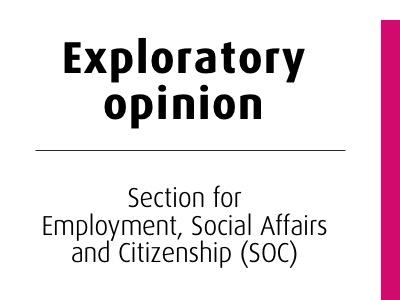European Economic
and Social Committee
Social Imbalances Procedure
Background:
The Social Imbalances Procedure (SIP) is a mechanism aimed at detecting and correcting social imbalances within Member States at an early stage. It was proposed by the Belgian and Spanish governments, ahead of the Porto Social Summit of May 2021, to prevent a possible erosion of social cohesion in a given country and its spill-over to other countries. According to the EESC, social imbalances should be defined as critical situations identified by the social scoreboard of the European Pillar of Social Rights (EPSR), the EU's blueprint for achieving a more socially just Europe. They can also be defined as clear deviations from the path to achieving the EPSR Action Plan targets. Among other things, the EPSR targets include a reduction of at least 15 million in the number of people at risk of poverty or social exclusion and 78% of working age people in employment by 2030.
The proposed procedure, which should apply when a country's social indicators start deteriorating, comes at a time when citizens are demanding a more socially just Europe. Recent Eurobarometer surveys show that poverty and social exclusion top the list of concerns for 82% of Europeans. As many as 93% of Europeans are worried about the rising cost of living. Another Eurobarometer survey shows that 78% of Europeans believe that overall public spending on key social policies should increase.
Key points:
In the opinion, the EESC:
• considers the Social Imbalance Procedure (SIP) an opportunity to enhance the coordination of national efforts to improve their social governance and reduce social inequalities within a country and between Member States (that is, to achieve upward social convergence). Fiscal, macroeconomic and environmental governance are developed and better coordinated than social governance in the EU, with multiple crises and their long-term effects jeopardising social rights and deepening social disparities between Europe's regions and countries;
• underlines that the SIP should be integrated into the European Semester, throughout its different phases. The European Commission and the Council should use the Joint Employment Report, the Country Reports and ad hoc in-depth reviews to identify and address the social imbalances. The country-specific recommendations should address such imbalances and encourage Member States to implement specific reforms. In response, after consultation with social partners and civil society organisations, the Member State concerned should propose the necessary initiatives and reforms to improve the critical situations identified in the Country Reports;
• calls on the Commission and the Member States to consider making existing rules for funds allocation (including the ESIF, RRF and others) more flexible so that they can be quickly adapted to current societal challenges and critical situations identified in the implementation of the SIP.
The text of the draft opinion can be found here.
Additional information
Section: Employment, Social Affairs and Citizenship (SOC)
Opinion number: SOC/748
Opinion type: Exploratory opinion at the request of the Spanish Presidency
Rapporteur: Justyna Kalina OCHĘDZAN
Reference: Letter from the Spanish Presidency of the EU Council, 27/07/2022
Date of adoption by section: 03/04/2023
Result of the vote: 87 in favour / 0 against / 0 abstentions
Date of adoption in plenary: 27/04/2023
Result of the vote:
Contacts:
Press officer: Laura Lui
Tel.: 00 32 2 546 9189
email: laurairena.lui@eesc.europa.eu
Administrator: Margherita Logrillo
Tel.: 00 32 2 546 9099
email: Margherita.Logrillo@eesc.europa.eu
